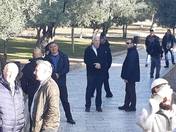11 dec 2018
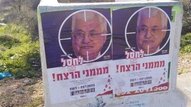
This picture shows a post set up by extremist Israeli settler groups near Yitzhar settlement south of the occupied West Bank city of Nablus on December 11, 2018, calling for the assassination of Palestinian President Mahmoud Abbas.
Extremist Israeli settler groups have launched an incitement campaign against Palestinian President Mahmoud Abbas in the northern part of the occupied West Bank, calling for his assassination.
Palestinian sources, requesting anonymity, said Israeli settlers put up posters near Yitzhar settlement south of the city of Nablus, located approximately 49 kilometers (30 miles) north of Jerusalem al-Quds, on Tuesday, calling for the killing of Abbas.
The posters read “supporter of terrorists” referring to Abbas as the financier of operations against settlers in the West Bank.
PLO slams Israeli settlers' call for Abbas assassination
Meanwhile, Secretary General of the Palestine Liberation Organization (PLO) Saeb Erekat said on Tuesday that Tel Aviv regime should be held accountable for the consequences of the settlers' call for the "assassination" of the Palestinian president.
Erekat said in a press statement that such a call is in line with “a systematic incitement campaign by Israel against our people and their rightful demands.”
“The call for the killing of the Palestinian president is an initiative to open assassination of the president and the liquidation of the leadership's peace strategy,” he pointed out.
Erekat added that the Palestinian people and their leadership “take this threat seriously and demand the international community to move immediately to halt Israel's unlawful policies and practices before it is too late.”
He also stressed the importance of providing the Palestinian people with international protection, saying, “International community's silence paves the way for more killings of civilians and ethnic cleansing.”
The development came only two day after the UN Office for the Coordination of Humanitarian Affairs (OCHA) announced in a report that at least 11 attacks had been conducted by Israeli settlers against Palestinians in the West Bank between November 20 and December 3, resulting in Palestinian property damage.
Furthermore, about 85 Palestinian-owned trees, mostly olive ones, had been vandalized by Israeli settlers in Turmusayya village, near Ramallah.
In five other incidents in different localities of the West Bank, Israeli settlers punctured the tires of 52 Palestinian vehicles, and wrote racist and anti-Arab slogans with spray on some of the vehicles and on the walls of schools, mosques and several homes.
On October 12, a 47-year-old Palestinian woman, identified as Aisha Mohammad Aravi, was killed near a checkpoint south of Nablus after being struck by stones thrown by Israeli settlers while driving with her husband.
According to Palestinian media outlets, Aravi was hit in the head by the stones and died shortly after the incident. Her husband was wounded moderately.
Less than a month before US President Donald Trump took office, the United Nations Security Council adopted Resolution 2334, calling on Israel to “immediately and completely cease all settlement activities in the occupied Palestinian territories, including East Jerusalem” al-Quds.
About 600,000 Israelis live in over 230 illegal settlements built since the 1967 Israeli occupation of the Palestinian territories of the West Bank and East Jerusalem al-Quds.
Palestinians want the West Bank as part of a future independent Palestinian state with East Jerusalem al-Quds as its capital.
The last round of Israeli-Palestinian talks collapsed in 2014. Among the major sticking points in those negotiations was Israel’s continued settlement expansion on Palestinian territories.
Trump backtracked on Washington’s support for a “two-state solution” earlier this year, saying he would support any solution favored by both sides.
“Looking at two-state or one-state, I like the one that both parties like. I’m very happy with the one both parties like. I can live with either one,” the US president said during a joint press conference with Israeli Prime Minister Benjamin Netanyahu in Washington on February 15.
Extremist Israeli settler groups have launched an incitement campaign against Palestinian President Mahmoud Abbas in the northern part of the occupied West Bank, calling for his assassination.
Palestinian sources, requesting anonymity, said Israeli settlers put up posters near Yitzhar settlement south of the city of Nablus, located approximately 49 kilometers (30 miles) north of Jerusalem al-Quds, on Tuesday, calling for the killing of Abbas.
The posters read “supporter of terrorists” referring to Abbas as the financier of operations against settlers in the West Bank.
PLO slams Israeli settlers' call for Abbas assassination
Meanwhile, Secretary General of the Palestine Liberation Organization (PLO) Saeb Erekat said on Tuesday that Tel Aviv regime should be held accountable for the consequences of the settlers' call for the "assassination" of the Palestinian president.
Erekat said in a press statement that such a call is in line with “a systematic incitement campaign by Israel against our people and their rightful demands.”
“The call for the killing of the Palestinian president is an initiative to open assassination of the president and the liquidation of the leadership's peace strategy,” he pointed out.
Erekat added that the Palestinian people and their leadership “take this threat seriously and demand the international community to move immediately to halt Israel's unlawful policies and practices before it is too late.”
He also stressed the importance of providing the Palestinian people with international protection, saying, “International community's silence paves the way for more killings of civilians and ethnic cleansing.”
The development came only two day after the UN Office for the Coordination of Humanitarian Affairs (OCHA) announced in a report that at least 11 attacks had been conducted by Israeli settlers against Palestinians in the West Bank between November 20 and December 3, resulting in Palestinian property damage.
Furthermore, about 85 Palestinian-owned trees, mostly olive ones, had been vandalized by Israeli settlers in Turmusayya village, near Ramallah.
In five other incidents in different localities of the West Bank, Israeli settlers punctured the tires of 52 Palestinian vehicles, and wrote racist and anti-Arab slogans with spray on some of the vehicles and on the walls of schools, mosques and several homes.
On October 12, a 47-year-old Palestinian woman, identified as Aisha Mohammad Aravi, was killed near a checkpoint south of Nablus after being struck by stones thrown by Israeli settlers while driving with her husband.
According to Palestinian media outlets, Aravi was hit in the head by the stones and died shortly after the incident. Her husband was wounded moderately.
Less than a month before US President Donald Trump took office, the United Nations Security Council adopted Resolution 2334, calling on Israel to “immediately and completely cease all settlement activities in the occupied Palestinian territories, including East Jerusalem” al-Quds.
About 600,000 Israelis live in over 230 illegal settlements built since the 1967 Israeli occupation of the Palestinian territories of the West Bank and East Jerusalem al-Quds.
Palestinians want the West Bank as part of a future independent Palestinian state with East Jerusalem al-Quds as its capital.
The last round of Israeli-Palestinian talks collapsed in 2014. Among the major sticking points in those negotiations was Israel’s continued settlement expansion on Palestinian territories.
Trump backtracked on Washington’s support for a “two-state solution” earlier this year, saying he would support any solution favored by both sides.
“Looking at two-state or one-state, I like the one that both parties like. I’m very happy with the one both parties like. I can live with either one,” the US president said during a joint press conference with Israeli Prime Minister Benjamin Netanyahu in Washington on February 15.
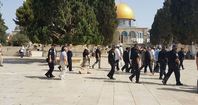
Dozens of Jewish settlers and officers on Tuesday morning desecrated the Aqsa Mosque under police escort.
An official source from the Islamic Awqaf Authority told Quds Press that Israeli police forces provided protection for scores of settlers and officers as they were touring the Aqsa Mosque’s courtyards.
Some settlers were reportedly seen performing prayers during their tours.
Meanwhile, the Israeli police at the entrances leading to the Mosque imposed entry restrictions on Muslim worshipers during the presence of settlers inside.
The Israeli police allow Jewish settlers to enter and tour the Mosque every day except on Friday and Saturday.
An official source from the Islamic Awqaf Authority told Quds Press that Israeli police forces provided protection for scores of settlers and officers as they were touring the Aqsa Mosque’s courtyards.
Some settlers were reportedly seen performing prayers during their tours.
Meanwhile, the Israeli police at the entrances leading to the Mosque imposed entry restrictions on Muslim worshipers during the presence of settlers inside.
The Israeli police allow Jewish settlers to enter and tour the Mosque every day except on Friday and Saturday.
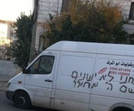
A number of fanatic illegal Israeli colonialist settlers infiltrated, on Tuesday at dawn, into Beitin Palestinian village, east of the central West Bank city of Ramallah, punctured tires of parked cars and wrote racist graffiti.
Media sources in Ramallah said the assailants came from Beit El illegal colony, which was built on lands owned by the villagers.
The sources added that the attackers punctured the tires of many cars, and wrote racist graffiti on several walls and cars, before fleeing the area.
The assault came just hours after the colonists attacked dozens of Palestinian cars, near an Israeli military roadblock in the area, causing damage.
Media sources in Ramallah said the assailants came from Beit El illegal colony, which was built on lands owned by the villagers.
The sources added that the attackers punctured the tires of many cars, and wrote racist graffiti on several walls and cars, before fleeing the area.
The assault came just hours after the colonists attacked dozens of Palestinian cars, near an Israeli military roadblock in the area, causing damage.
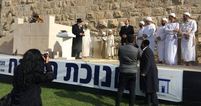
Jewish activists, who hope to see the temple mount built in place of the Aqsa Mosque, unveiled a new altar in Occupied Jerusalem Monday, which they say is intended to be placed in the future on the mount after removing the Mosque and used to offer animal sacrifices.
According to Haaretz newspaper, , these activists, who are preparing for a rebuilt temple by recreating some of the ancient tools used in temple rituals, have been practicing, for the past decade, the offering of sacrifices in the days before Passover.
On Monday, the activists wanted to practice using the altar but had to make do with only part of the service because the Israeli Jerusalem municipality refused to let them slaughter an animal in a public park.
“In the end, there will be a grander altar, but for the time being we have this, and the moment they open the gates we’re ready to take it up to the temple mount,” senior temple mount activist Shimshon Elboim told the newspaper.
So far the practice sessions have included slaughtering an animal and offering it on a temporary altar of wood in an area near the western wall of the Mosque
On Monday, the activists wanted to execute the complete ritual of slaughtering the animal and offering it after they received a permit from the police for that, but the municipality’s legal adviser rejected their request to slaughter an animal in a public park outside the Old City walls, thus the sheep earmarked for this purpose was taken to another location to be slaughtered.
“What we still have to do is awaken the people,” Elboim said. “There is slow but sure progress, and if the authorities allow it, tomorrow we can do the whole service.”
According to Haaretz newspaper, , these activists, who are preparing for a rebuilt temple by recreating some of the ancient tools used in temple rituals, have been practicing, for the past decade, the offering of sacrifices in the days before Passover.
On Monday, the activists wanted to practice using the altar but had to make do with only part of the service because the Israeli Jerusalem municipality refused to let them slaughter an animal in a public park.
“In the end, there will be a grander altar, but for the time being we have this, and the moment they open the gates we’re ready to take it up to the temple mount,” senior temple mount activist Shimshon Elboim told the newspaper.
So far the practice sessions have included slaughtering an animal and offering it on a temporary altar of wood in an area near the western wall of the Mosque
On Monday, the activists wanted to execute the complete ritual of slaughtering the animal and offering it after they received a permit from the police for that, but the municipality’s legal adviser rejected their request to slaughter an animal in a public park outside the Old City walls, thus the sheep earmarked for this purpose was taken to another location to be slaughtered.
“What we still have to do is awaken the people,” Elboim said. “There is slow but sure progress, and if the authorities allow it, tomorrow we can do the whole service.”
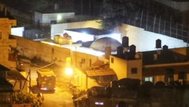
Dozens of Palestinian youth suffered from tear-gas inhalation, predawn Monday, during violent confrontations which broke out after hundreds of Israeli settlers stormed Joseph’s Tomb, in the northern occupied West Bank city of Nablus.
Ma’an reported that confrontations were triggered when Israeli settlers began performing Jewish religious rituals in Joseph’s Tomb, under the tight security of Israeli forces.
Sources added that Israeli forces fired rubber-coated steel bullets, tear-gas bombs, and stun grenades towardthe youth.
Joseph’s Tomb is revered by Jews, Muslims, Christians, and Samaritans alike. The Israeli military allows Jews to visit as part of organized pilgrimages, despite the site being located in Area A where the PA has full control, and prohibits Muslims from worshiping at the site.
Ultra-orthodox and nationalist Jews regularly try to visit the shrine without approval, as many Jews believe the tomb to be the final resting place of the biblical figure in the Old Testament.
Palestinians believe that Joseph’s Tomb is the funerary monument to Sheikh Yousif Dweikat, a local religious figure.
Ma’an reported that confrontations were triggered when Israeli settlers began performing Jewish religious rituals in Joseph’s Tomb, under the tight security of Israeli forces.
Sources added that Israeli forces fired rubber-coated steel bullets, tear-gas bombs, and stun grenades towardthe youth.
Joseph’s Tomb is revered by Jews, Muslims, Christians, and Samaritans alike. The Israeli military allows Jews to visit as part of organized pilgrimages, despite the site being located in Area A where the PA has full control, and prohibits Muslims from worshiping at the site.
Ultra-orthodox and nationalist Jews regularly try to visit the shrine without approval, as many Jews believe the tomb to be the final resting place of the biblical figure in the Old Testament.
Palestinians believe that Joseph’s Tomb is the funerary monument to Sheikh Yousif Dweikat, a local religious figure.

Dozens of illegal Israeli colonists attacked, Monday, a Palestinian home in Huwwara town, south of the northern West Bank city of Nablus, and hurled stones at cars near Huwwara military roadblock.
Media sources in Nablus have reported that the illegal colonists surrounded a home in Huwwara, and hurled stones at it, causing damage.
Ghassan Daghlas, a Palestinian Authority official who monitors Israel’s illegal colonialist activities, said the colonists attacked the home of Ahmad Lufti, located at the edge of the town.
Daghlas added that the colonists also attacked scrap yard for cars, near Lutfi’s home, and caused damage to the property.
Furthermore, the colonists hurled stones at Palestinian cars near Huwwara military roadblock, after the soldiers closed it, preventing the Palestinian from crossing in both directions.
The colonists also hurled stones at cars on the main Nablus-Qalqilia road, and obstructed Palestinian traffic.
In related news, dozens of soldiers invaded the al-Lubban ash-Sharqiya village, south of Nablus, and distributed leaflets threatening constant punishment and invasions if the Palestinians do not stop protesting.
It is worth mentioning that the colonist settlers also hurled stones at Palestinian cars, near the entrance of Beitin village, east of Ramallah, in central West Bank, causing damage.
Media sources in Nablus have reported that the illegal colonists surrounded a home in Huwwara, and hurled stones at it, causing damage.
Ghassan Daghlas, a Palestinian Authority official who monitors Israel’s illegal colonialist activities, said the colonists attacked the home of Ahmad Lufti, located at the edge of the town.
Daghlas added that the colonists also attacked scrap yard for cars, near Lutfi’s home, and caused damage to the property.
Furthermore, the colonists hurled stones at Palestinian cars near Huwwara military roadblock, after the soldiers closed it, preventing the Palestinian from crossing in both directions.
The colonists also hurled stones at cars on the main Nablus-Qalqilia road, and obstructed Palestinian traffic.
In related news, dozens of soldiers invaded the al-Lubban ash-Sharqiya village, south of Nablus, and distributed leaflets threatening constant punishment and invasions if the Palestinians do not stop protesting.
It is worth mentioning that the colonist settlers also hurled stones at Palestinian cars, near the entrance of Beitin village, east of Ramallah, in central West Bank, causing damage.
10 dec 2018
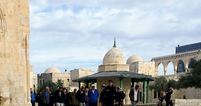
Dozens of Israeli settlers stormed on Monday morning Jerusalem’s al-Aqsa Mosque—the third holiest site in Islam—via the Maghareba Gate.
127 Israeli settlers, escorted by policemen, broke into al-Aqsa Mosque as part of the morning break-in shift and carried out a round of sacrilegious tours.
Dozens more are expected to show up at the site in the afternoon break-in shift.
At the same time, the peaceful Muslim worshipers have been subjected to tough crackdowns and restrictions by the Israeli police near the main entrances to the site.
Several worshipers have been searched and dozens more have had their IDs seized while attempting to enter al-Aqsa to perform their daily prayers.
127 Israeli settlers, escorted by policemen, broke into al-Aqsa Mosque as part of the morning break-in shift and carried out a round of sacrilegious tours.
Dozens more are expected to show up at the site in the afternoon break-in shift.
At the same time, the peaceful Muslim worshipers have been subjected to tough crackdowns and restrictions by the Israeli police near the main entrances to the site.
Several worshipers have been searched and dozens more have had their IDs seized while attempting to enter al-Aqsa to perform their daily prayers.
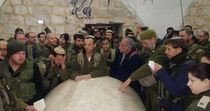
More than 7,000 Jewish settlers swarmed at dawn Monday archeological and religious sites in the occupied West Bank, where they performed rituals under military protection.
A Hebrew news website said that about 7,500 settlers entered sites in the towns of as-Samu and Halhul, and the Ibrahimi Mosque in al-Khalil as well as Joseph’s Tomb in eastern Nablus.
The website claimed that a pipe bomb was found and defused by the Israeli army in the area of Joseph’s Tomb, adding that Israeli soldiers were thrown with stones and Molotov cocktails during their presence in the same area.
Palestinian local sources in Nablus reported that hundreds of settlers stormed Joseph’s Tomb under military escort and embarked on performing loud rituals and dancing to music. video
They affirmed that violent clashes broke out between local young men and Israeli soldiers in different areas of eastern Nablus during the presence of settlers at the Tomb.
Four young men were detained by soldiers and two others were injured during the events.
In a separate incident, the Israeli occupation forces stormed Awarta town in eastern Nablus and handed a Palestinian ex-detainee called Samer Sharab a summons for interrogation.
In al-Khalil, dozens of settlers escorted by soldiers stormed after midnight Halhul city, where they performed rituals in Mamas area.
Israeli troops also stormed al-Khalil city and kidnapped a former prisoner called Husam al-Hashlamon from his home.
Another military force stormed al-Samu city in the south of al-Khalil, with no reported arrests.
A Hebrew news website said that about 7,500 settlers entered sites in the towns of as-Samu and Halhul, and the Ibrahimi Mosque in al-Khalil as well as Joseph’s Tomb in eastern Nablus.
The website claimed that a pipe bomb was found and defused by the Israeli army in the area of Joseph’s Tomb, adding that Israeli soldiers were thrown with stones and Molotov cocktails during their presence in the same area.
Palestinian local sources in Nablus reported that hundreds of settlers stormed Joseph’s Tomb under military escort and embarked on performing loud rituals and dancing to music. video
They affirmed that violent clashes broke out between local young men and Israeli soldiers in different areas of eastern Nablus during the presence of settlers at the Tomb.
Four young men were detained by soldiers and two others were injured during the events.
In a separate incident, the Israeli occupation forces stormed Awarta town in eastern Nablus and handed a Palestinian ex-detainee called Samer Sharab a summons for interrogation.
In al-Khalil, dozens of settlers escorted by soldiers stormed after midnight Halhul city, where they performed rituals in Mamas area.
Israeli troops also stormed al-Khalil city and kidnapped a former prisoner called Husam al-Hashlamon from his home.
Another military force stormed al-Samu city in the south of al-Khalil, with no reported arrests.
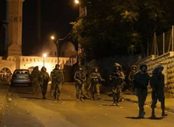
Dozens of Israeli soldiers accompanied, on Monday at dawn,several buses loaded with colonialist settlers into the northern West Bank city of Nablus to visit Joseph’s Tomb site, before clashing with local protesters,shooting four, and causing twenty to suffer the effects of teargas inhalation.
Media sources said the invasion was carried out into the eastern area of Nablus, to facilitate the entry of hundreds of colonialist settlers, before attacking dozens of Palestinian protesters, who hurled stones at them.
The sources added that the soldiers shot four Palestinians with rubber-coated steel bullets, and caused at least twenty to suffer the effects of teargas inhalation.
Local medics provided the needed treatment to the Palestinians who suffered the effects of teargas inhalation, and moved the four wounded residents to Rafidia governmental hospital.
Joseph’s the Patriarch is revered by Jews, Muslims,Christians and Samaritans, and the Israeli military allows Jews to visit as part of organized pilgrimages, despite the shrine being located in an area under control by the Palestinian Authority.
Media sources said the invasion was carried out into the eastern area of Nablus, to facilitate the entry of hundreds of colonialist settlers, before attacking dozens of Palestinian protesters, who hurled stones at them.
The sources added that the soldiers shot four Palestinians with rubber-coated steel bullets, and caused at least twenty to suffer the effects of teargas inhalation.
Local medics provided the needed treatment to the Palestinians who suffered the effects of teargas inhalation, and moved the four wounded residents to Rafidia governmental hospital.
Joseph’s the Patriarch is revered by Jews, Muslims,Christians and Samaritans, and the Israeli military allows Jews to visit as part of organized pilgrimages, despite the shrine being located in an area under control by the Palestinian Authority.
9 dec 2018
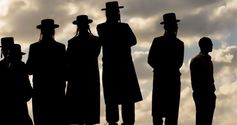
Dozens of Israeli settlers, escorted by policemen, stormed on Sunday al-Aarama Mount in Beita town, south of Nablus.
Israeli settlers performed Talmudic rituals in an archaeological site in the area.
Eyewitnesses said vehicles were seen carrying Israeli settlers into the area.
Israeli settlers performed Talmudic rituals in an archaeological site in the area.
Eyewitnesses said vehicles were seen carrying Israeli settlers into the area.
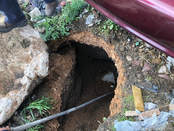
A large part of the church land behind al-Ein Mosque in Silwan district sustained considerable collapse after heavy rain, pouring for the second day, unveiled a network of Israeli tunnels beneath Palestinian homes and buildings in the area. video
Spokesman for the Silwan land defense committee Fakhri Abu Diyab told a reporter for the Palestinian Information Center (PIC) that “one of the benefits of rainfall is that it exposes the network of tunnels, which were dug by settler groups under Silwan real estate, homes and streets.”
According to Abu Diyab, most of the houses in the area has become suspended in the air and threatened with collapse after soil and rocks were withdrawn from under their foundations.
He pointed to the presence of widespread fractures in the walls of many houses as a result of Israeli underground diggings and tunnels.
The official urged the concerned international organizations to intervene to protect the lives of the local residents, affirming that the Israeli municipal authority refuses to make repairs to the homes suffering from cracks and also prevents the owners from renovating their homes.
Spokesman for the Silwan land defense committee Fakhri Abu Diyab told a reporter for the Palestinian Information Center (PIC) that “one of the benefits of rainfall is that it exposes the network of tunnels, which were dug by settler groups under Silwan real estate, homes and streets.”
According to Abu Diyab, most of the houses in the area has become suspended in the air and threatened with collapse after soil and rocks were withdrawn from under their foundations.
He pointed to the presence of widespread fractures in the walls of many houses as a result of Israeli underground diggings and tunnels.
The official urged the concerned international organizations to intervene to protect the lives of the local residents, affirming that the Israeli municipal authority refuses to make repairs to the homes suffering from cracks and also prevents the owners from renovating their homes.
